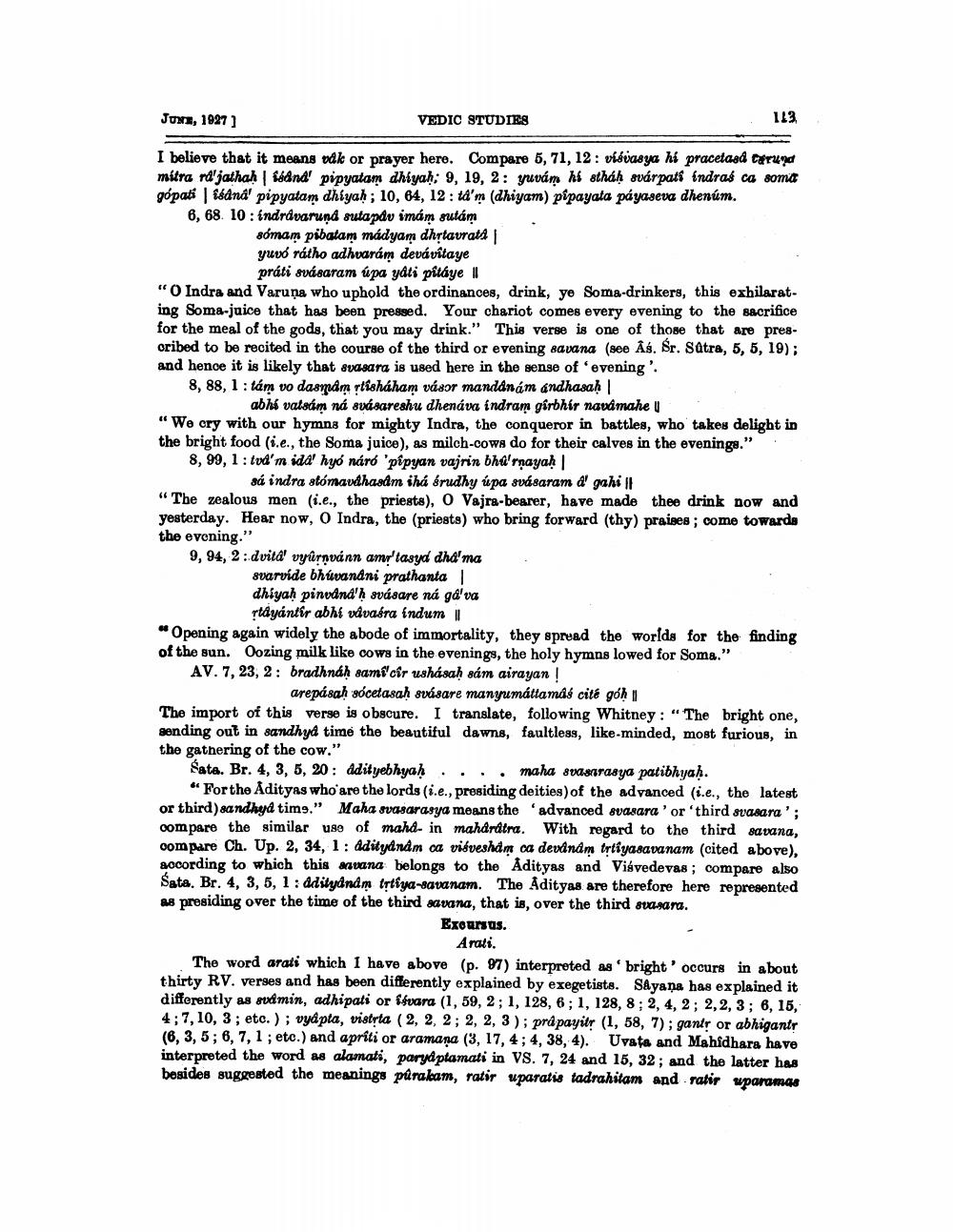________________
Jums, 1927)
VEDIC STUDIES
113
I believe that it means vdk or prayer here. Compare 5, 71, 12: visvasya hi pracetasd #rund mitra raljathah iadnd' pipyatam dhiyah; 9, 19, 2: yuvám hi stháh svárpati Indraś ca somit gópati isaná' pipyatam dhiyah ; 10, 64, 12: ta'm (dhiyam) pipayata payaseva dhenúm. 6, 68. 10: Indrdvarund sutapdv imám sutám
sómam pibatam mádyam dhrtavratti yuvó rátho adhvarám devávitaye
práti svásaram úpa yati pitaye 1 "O Indra and Varuna who uphold the ordinances, drink, ye Soma-drinkers, this exhilarating Soma-juice that has been pressed. Your chariot comes every evening to the sacrifice for the meal of the gods, that you may drink." This verse is one of those that are prescribed to be recited in the course of the third or evening savana (see As, Sr. Satra, 5, 5, 19); and henoe it is likely that avasara is used here in the sense of evening'. 8, 88, 1: tám vo dasmám rtisháham vásor mandanám andhasah
abhi vaterim ná svásareshu dhenáva indram girbhír navámahe “We cry with our hymns for mighty Indra, the conqueror in battles, who takes delight in the bright food (i.e., the Soma juice), as milch-cowe do for their calves in the eveninga." 8, 99, 1: tvd'm idal hyó náró 'pipyan vajrin bharnayah
sá indra stómavdhasdm ihá érudhy úpa svásaram a gahill “The zealous men (i.e., the priests), O Vajra-bearer, have made thee drink now and yesterday. Hear now, O Indra, the (priests) who bring forward (thy) praises; come towards the evening." 9, 94, 2: dvita' vyúrnvánn amr'tasya dhama
svarvide bhuvanani prathanta dhiyah pinudna'h svásare ná galva
rtdyanter abhi vavasra indum | "Opening again widely the abode of immortality, they spread the worlds for the finding of the sun. Oozing milk like cows in the evenings, the holy hymns lowed for Soma." AV. 7, 23, 2: bradhnah sami'cîr ushásah sám airayan!
arepásah sócetasah svásare manyumáttamas cité góh The import of this verse is obscure. I translate, following Whitney: "The bright one, sending out in sandhyd time the beautiful dawns, faultless, like-minded, most furious, in the gathering of the cow."
Sata. Br. 4, 3, 5, 20 : adityebhyah .... maha svasarasya patibhyah.
“For the Adityas who are the lords (i.e., presiding deities) of the advanced (i.e., the latest or third) sandhyd time." Maha svasarasya means the advanced svasara' or 'third svasara'; compare the similar use of mahd-in mahardtra. With regard to the third savana, oom pare Ch. Up. 2, 34, 1: adityanam ca viávesham ca devinam trtiyasavanam (cited above), according to which this savana belongs to the Adityas and Visvedevas; compare also Sata. Br. 4, 3, 5, 1: aditydndm trtiya-savanam. The Adityas are therefore here represented as presiding over the time of the third savana, that is, over the third svasara.
Exounus.
Arati. The word arati which I have above (p. 97) interpreted as bright' occurs in about thirty RV. verses and has been differently explained by exegetists. SAyana has explained it differently as svdmin, adhipati or isvara (1, 59, 2; 1, 128, 6; 1, 128, 8: 2, 4, 2; 2,2, 3; 6, 15, 4; 7, 10, 3; etc.); vyåpta, vistyta ( 2, 2, 2, 2, 2, 3); pra payitr (1, 58, 7); gantr or abhigante (6, 3, 5, 6, 7, 1 ; etc.) and apriti or aramana (3, 17, 4; 4, 38, 4). Uvata and Mahfdhara have interpreted the word as alamati, paryd ptamati in VS. 7, 24 and 15, 32; and the latter has besides suggested the meanings püralam, ratir uparatis tadrahitam and natir wparamas




